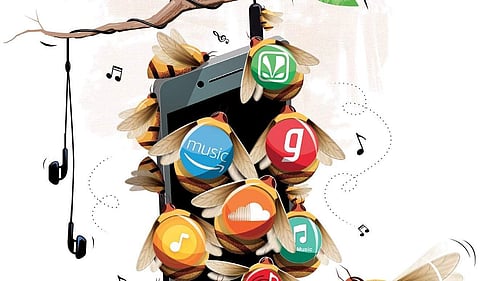

After months of uncertainty, global music streaming giant Spotify finally entered the Indian OTT market this week, with the company deciding to significantly scale down its prices to better suit the domestic market. Even with this, however, the firm has an uphill battle on its hands if it wants to achieve the kind of dominance it enjoys in overseas markets.
There are several factors set to make Spotify’s journey difficult in India. The first, of course, is the large number of competitors it has to deal. To make things worse, all its major rivals have a significant head start. For instance, its overseas peers — Apple Music, Google Play Music and Amazon Prime — have been operating in India for a while. And JioSaavn and Gaana, the two largest local players, have been in play for even longer.
“Spotify has a huge brand, but it is difficult for the firm to transfer this recognition to the Indian market because of the profile of its potential customers. While urban youth are likely to be more aware of its dominance overseas, the Indian jackpot is actually in its hinterlands. And there, it will have to build up its brand from scratch,” said an executive with one of India’s largest OTT players.
Another hurdle in Spotify’s path to success in the country is the lack of ready opportunities for integration into larger ecosystems. This is a problem players like Apple Music, Google Play Music and Amazon do not have to deal with. And JioSaavn’s links to India’s fastest growing telecom service provider gives it a significant leg-up too. According to industry observers, the music streaming market in India is currently dominated by two players: Google Play Music with close to 65 per cent market share and JioSaavn, with a share of around 25 per cent.
While initially plagued by piracy, India has become a lucrative market for music streaming companies, at least for those which have embraced the unique business models needed to ace it. For Spotify however, rights to some of its most popular properties remain in question. While it has signed agreements with India’s top music rights holders like T-Series, it is still embroiled in a legal battle with one of the world’s largest music labels: Warner/Chappell Music.
This has thrown a spanner into the works, bringing into question the availability of many popular music properties -- including works by Ed Sheeran, David Guetta, Linkin Park, ColdPlay, Camilla Cabello, Wiz Khalifa and Metallica.But, despite all this, industry experts say that its entry is likely to be good news for customers and advertisers both.
For one, Spotify has one of the best customisation options available to its users, a prime reason for its global appeal. The increased competition is also generally an attractive proposition for customers, with pricing expected to remain extremely competitive as brands seek to undercut each other.
And Indian advertisers have already rushed to book spots on the platform, with reports stating that major brands like OnePlus, Brand USA, and Anheuser-Busch InBev have acquired exclusive rights to launch advertising campaigns on Spotify India.